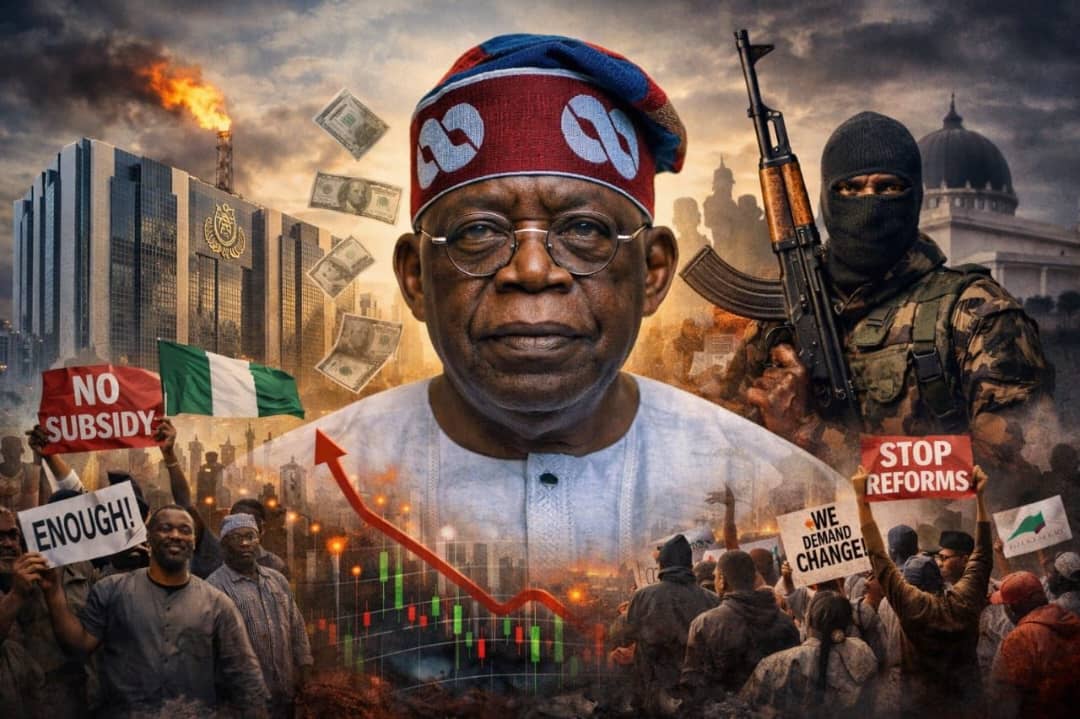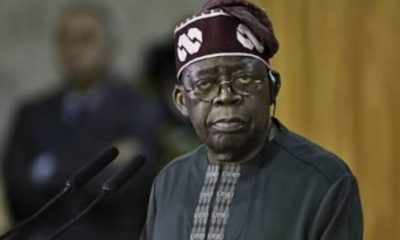society
Borno Losing Ground to Boko Haram: A Nation in Denial, a Governor in Distress

Borno Losing Ground to Boko Haram: A Nation in Denial, a Governor in Distress
By George Omagbemi Sylvester
In a chilling cry that cuts through the numb silence of a weary nation, Governor Babagana Zulum of Borno State has once again lamented the relentless assault of Boko Haram, warning that his state—once a bastion of resistance against terrorism—is gradually losing ground to the insurgents. His words are not only a cry for help but also a damning indictment of a nation that has normalized tragedy, desensitized itself to carnage, and continues to gamble with the blood of its citizens.
This is not a new story. It is the same tale of bloodshed, displacement, and despair—only now, it is resurfacing with greater urgency. In Governor Zulum’s own words, “The resurgence of Boko Haram in parts of Borno is deeply worrisome. We cannot continue to pretend that all is well.” These are not the empty complaints of a politician seeking attention. They are the warnings of a leader on the frontline, who sees firsthand what Abuja refuses to confront: the war against terrorism is far from over, and Nigeria is losing it—again.
A False Sense of Victory
In 2015, the All Progressives Congress (APC) rode to power on the back of promises to defeat Boko Haram, eradicate corruption, and stabilize the economy. A decade later, the group remains active, its factions—particularly the Islamic State West Africa Province (ISWAP)—now more organized, more brutal, and more entrenched. In December 2020, the United Nations estimated that over 36,000 people had been killed in the conflict, with more than 2 million displaced in the Northeast. Those numbers have only grown, with over 11 million people now in need of humanitarian assistance in Borno, Adamawa, and Yobe states as of 2024.
While successive administrations have claimed to have “technically defeated” Boko Haram, the ground reality paints a starkly different picture. Boko Haram continues to operate freely in parts of southern Borno, Sambisa Forest, and the Lake Chad Basin. Just last month, insurgents overran military positions in Guzamala and attacked communities in Gwoza, killing civilians and security personnel alike. These are not isolated incidents; they are coordinated, strategic offensives designed to reestablish territorial dominance.
Zulum: The Lone Voice in the Wilderness
Governor Zulum’s courage in speaking out deserves national commendation. Unlike many of his counterparts who wallow in silence or peddle the central government’s propaganda, Zulum has consistently challenged the federal security architecture, demanding more boots on the ground, better intelligence sharing, and genuine political will.
In April 2024, during a security meeting in Maiduguri, Zulum warned that Boko Haram fighters were regrouping and that displaced persons living in IDP camps could not return to their ancestral homes due to insecurity. “Our soldiers are overwhelmed,” he stated. “Without increased federal support, we risk losing everything we’ve fought for in the last 10 years.”
Indeed, Nigeria spends over ₦2 trillion annually on defense, yet the country remains one of the most terrorized in the world. According to the Global Terrorism Index 2024, Nigeria remains in the top 10 of countries most affected by terrorism. Despite enormous budget allocations, corruption, poor accountability, and bureaucratic incompetence have rendered Nigeria’s counterterrorism strategy toothless.
The Consequences of Failure
The implications of Borno losing ground to Boko Haram are staggering. First, it spells humanitarian catastrophe. Over 700,000 children in Borno State alone face severe malnutrition, and if access to remote areas becomes even more restricted, the death toll from hunger could soon rival that from bullets.
Second, it undermines national security. The resurgence of terrorism in the Northeast could embolden other armed groups in the Northwest and Northcentral—bandits, kidnappers, and separatist militias—thus plunging the country into further anarchy. In a nation already teetering on the edge, Borno’s descent into lawlessness could trigger a chain reaction of state failures.
Third, it discredits Nigeria’s international reputation. The country has received significant support from international allies, including the United States, the European Union, and the United Nations. Yet, donor fatigue is setting in. The world is growing tired of helping a government that appears unwilling—or unable—to help itself. Nigeria risks becoming the poster child of wasted aid and lost hope.
Abuja Must Wake Up
The federal government can no longer afford to downplay Zulum’s warnings. His alarm should prompt a total reevaluation of Nigeria’s security framework. The Nigerian Army, overstretched and under-equipped, cannot continue to bear this burden alone. There must be a comprehensive approach that includes:
Decentralization of Security: State policing and community defense structures must be legalized and properly regulated. The centralization of security under Abuja has failed. It is time to empower state and local authorities to take charge of their regions.
Intelligence-Driven Warfare: Technology, surveillance drones, and real-time intelligence must be the cornerstone of military operations. Boko Haram’s movements should not come as a surprise in the era of satellite monitoring and AI-powered tracking.
Cutting Off Financing: Boko Haram sustains itself through extortion, illegal taxation of farmers, and foreign funding. The Nigerian Financial Intelligence Unit (NFIU) must be empowered to aggressively trace and freeze terrorist-linked accounts.
Rehabilitation and Reintegration: While military force is essential, so too is de-radicalization. The failure of Nigeria’s past reintegration programs stems from the absence of post-release monitoring, community engagement, and economic reinsertion. Ex-combatants must be tracked and employed, not released into the shadows.
Conclusion: A Nation at the Crossroads
Governor Zulum has laid bare the uncomfortable truth that many at the top are unwilling to hear: Borno is slipping, and with it, Nigeria is unraveling. This is not the time for political spin or cosmetic reforms. This is the time for radical honesty, brave leadership, and urgent action.
As citizens, we must amplify Zulum’s voice. As intellectuals, we must dissect the systemic failures that brought us here. And as a nation, we must decide: are we going to keep pretending that Nigeria is safe while Borno burns? Or are we going to rise, confront the monster of terror head-on, and reclaim our land?
History will not be kind to those who watched in silence while Borno bled. And if we fail to act now, the lament of Zulum today will become the requiem of Nigeria tomorrow.
news
Journalists for Good Governance Shines Searchlight on Local Government Administration

Journalists for Good Governance Shines Searchlight on Local Government Administration
…Calls for Accountability in Nigeria’s Grassroots Governance
LAGOS, Nigeria — A civil society coalition known as Journalists for Good Governance(JGG) has intensified public debate on transparency and accountability within Nigeria’s local government system, urging media professionals, civil society actors, and citizens to hold grassroots leaders accountable.
Speaking an event in Lagos recently, the acting chairman of the society, Comrade Bunmi Obarotimi said that despite reforms such as the Supreme Court’s 2024 ruling granting financial autonomy to all 774 Local Government Areas (LGAs), systemic challenges continues to hinder effective service delivery and responsible stewardship of public funds.
“Local governments are the closest tier of government to the people — yet too often they remain the least transparent. Without civic oversight and vibrant media, promises of autonomy ring hollow.” the acting chairman said.
The Journalist for Good Governance emphasised crucial roles that journalists can play in uncovering discrepancies in council spending, flagging poor service delivery, and educating citizens on their rights. Their call comes amid wider efforts by media and civic organisations to bridge accountability gaps. The civil society initiatives had previously launched monitoring campaigns to track local government expenditures and have been quietly advocating for transparency in how public money is deployed.
The leaders of the Journalists for Good Governance (JGG) highlighted the importance of physical assessment and citizens engagement on projects to boost people’s confidence, urging local councils to adopt open data platforms and proactive information dissemination in compliance with the Freedom of Information Act. Experts say the majority of LGAs currently lack operational websites or digital portals, further limiting public scrutiny.
The Journalists for Good Governance initiative aligns with sustained advocacy by civil society groups and governance experts calling for a collective approach to strengthening democratic accountability, and has decided to engage in critical and holistic assessments of how Local Governments is being run and the impact and quality of projects they embark-on and to address deficits in transparency and public trust.
Meanwhile, some state governments have signalled support for improved community engagement. In Lagos State, authorities reiterated a commitment to enhancing community media platforms as vehicles for civic participation and accountability at the grassroots level.
The renewed spotlight on local government administration has reignited public debate over fiscal responsibility and priorities. Controversies such as the widely criticised Adamawa council chairmen’s wives trip to Istanbul — which drew public outrage for perceived misuse of public funds — underscore why watchdog groups say stronger oversight mechanisms are urgently needed at the grassroots.
Citizens and activists have welcomed the journalists’ initiative, calling for sustained media engagement that goes beyond headlines to influence policy and accountability reform.
The civic rights advocates note that real change will require robust legal frameworks, a free press, and empowered communities equipped to demand transparency at every level of governance.
As Journalists for Good Governance mobilises its members, the coming months are likely to see heightened media attention on grassroots administration — from council budgets and service delivery to the enforcement of public information laws and digital transparency initiatives.
society
Good Politics Or Just Power? Two Years After The Elections

Good Politics Or Just Power? Two Years After The Elections
Two years after the last general election, Nigerians are justified in asking a direct question: is our democracy stronger today than it was then? Democracy is not measured by how many offices a party controls or how loudly politicians speak. It is measured by integrity, accountability, and the lived experience of the people. Good Politics demands more than victory at the polls; it demands moral leadership and visible progress in the lives of citizens.
The debate over amendments to the Electoral Act should have provided an opportunity to deepen transparency and strengthen public confidence. Instead, hesitation to fully embrace reforms that safeguard credible vote transmission and accountability has fueled doubt. In a nation where electoral credibility remains fragile, any reluctance to reinforce safeguards sends the wrong signal. Good Politics stands firmly for processes that are open, fair, and beyond suspicion.
The party in power commands significant authority across the federation. With control of the presidency, many state governments, a strong presence in the National Assembly, and influence at local levels, there should be no anxiety about reforms that ensure free and fair elections. Confidence in leadership is demonstrated not by dominance, but by a willingness to subject power to scrutiny. Politics rooted in the omoluabi ethos embraces fairness, transparency, and responsibility, even when inconvenient.
This is the standard long associated with Awolowo, whose politics emphasized discipline, social welfare, education, and institutional strength. His vision was not merely about holding office, but about transforming society through principled governance. Good Politics follows that tradition. It rejects manipulation, arrogance, and the concentration of power without accountability. It insists that authority must serve the people, not itself.
Beyond electoral reforms, democracy must deliver tangible relief. Across the country, households struggle with rising prices and shrinking purchasing power. Small businesses are burdened by escalating costs. Young people search for opportunities that remain scarce. When economic hardship deepens, democracy feels abstract. Good Politics recognizes that political legitimacy is reinforced when citizens can see and feel the benefits of governance.
The concentration of power within a single political structure should translate into coordinated reform and measurable development. When it does not, questions naturally arise. Democracy weakens when dominance replaces performance. It weakens when loyalty to party eclipses loyalty to principle. The omoluabi tradition teaches that character defines leadership. Without character, authority becomes hollow.
A healthy democracy requires credible elections and compassionate governance. It requires leaders who understand that politics is a moral enterprise. Two years into this administration, many Nigerians remain uncertain about the direction of both our democratic processes and their daily welfare. If democracy is to endure, it must reflect Good Politics: fairness in competition, integrity in conduct, and compassion in governance. Anything less falls short of the standard that our history and our values demand.
news
GEN CHRISTOPHER GWABIN MUSA SUPPORT INITIATIVE COMMENDS STATE-FEDERAL COLLABORATION IN ZAMFARA

GEN CHRISTOPHER GWABIN MUSA SUPPORT INITIATIVE COMMENDS STATE-FEDERAL COLLABORATION IN ZAMFARA
The Gen Christopher Gwabin Musa Support Initiative (GCGMSI) has commended the Zamfara State Government for its decisive contribution to security operations through the donation of newly acquired armoured personnel carriers (APCs), surveillance drones, and other critical operational equipment to troops and security agencies in the state.
This commendation was contained in a statement signed by the Convener of the GCGMSI, Ibrahim Dahiru Danfulani, Sadaukin Garkuwan Keffi/Betara Biu, and made available to the press.
The equipment was formally commissioned on Wednesday, February 18, by the Grand Patron of the GCGMSI and Minister of Defence, General Christopher Gwabin Musa, OFR (rtd.), in a ceremony at the Government House, Gusau. The event was attended by senior military officers, heads of security agencies, and top officials of the Zamfara State Government.
The GCGMSI, in its statement, hailed the donation as a “transformative and timely intervention” that aligns perfectly with its core objective of advocating for and supporting tangible measures that enhance the operational capacity and welfare of Nigeria’s security forces. The Initiative praised Governor Dauda Lawal’s administration for moving beyond rhetoric to actionable, material support, describing the move as a “blueprint for state-level collaboration in national security.”
“The provision of these assets by the Zamfara State Government is a testament to visionary leadership and a profound commitment to the peace and stability of its people,” the GCGMSI statement read. “It represents the exact kind of synergistic partnership between state and federal authorities that the GCGMSI champions. This initiative will significantly close operational gaps, boost the confidence of our gallant troops, and send a strong message to criminal elements.”
Speaking at the commissioning, General Musa emphasized that sustained collaboration is indispensable in confronting the nation’s evolving security challenges. He specifically commended Governor Lawal for his proactive support.
“Governor Dauda Lawal has demonstrated exemplary leadership and an unwavering dedication to the security of Zamfara State,” the Defence Minister stated. “The provision of these armoured vehicles, surveillance drones, and other operational equipment will undoubtedly boost the morale and operational effectiveness of our troops and other security agencies on the ground. This is a commendable effort that should be emulated by others.”
The newly commissioned assets, which include multiple APCs and advanced surveillance drones, are expected to dramatically enhance the mobility, protection, intelligence-gathering, and rapid response capabilities of security forces, particularly in the state’s remote and difficult terrains where anti-banditry operations are ongoing.
In his remarks, Governor Lawal reiterated his administration’s steadfast commitment to being a reliable partner in the security architecture. He urged security agencies to deploy the new resources responsibly and effectively to safeguard lives and property.
The Federal Government, through the Ministry of Defence, reaffirmed its commitment to continuing and deepening such partnerships with state governments across the nation to strengthen coordination and resource allocation in the collective fight against insecurity.
The GCGMSI concluded its statement by urging other state governments to take a cue from Zamfara’s “bold and pragmatic” approach, affirming that such concrete support is vital for achieving lasting peace and security across Nigeria.
-

 celebrity radar - gossips6 months ago
celebrity radar - gossips6 months agoWhy Babangida’s Hilltop Home Became Nigeria’s Political “Mecca”
-

 society6 months ago
society6 months agoPower is a Loan, Not a Possession: The Sacred Duty of Planting People
-

 society5 months ago
society5 months agoReligion: Africa’s Oldest Weapon of Enslavement and the Forgotten Truth
-

 news6 months ago
news6 months agoTHE APPOINTMENT OF WASIU AYINDE BY THE FEDERAL GOVERNMENT AS AN AMBASSADOR SOUNDS EMBARRASSING










